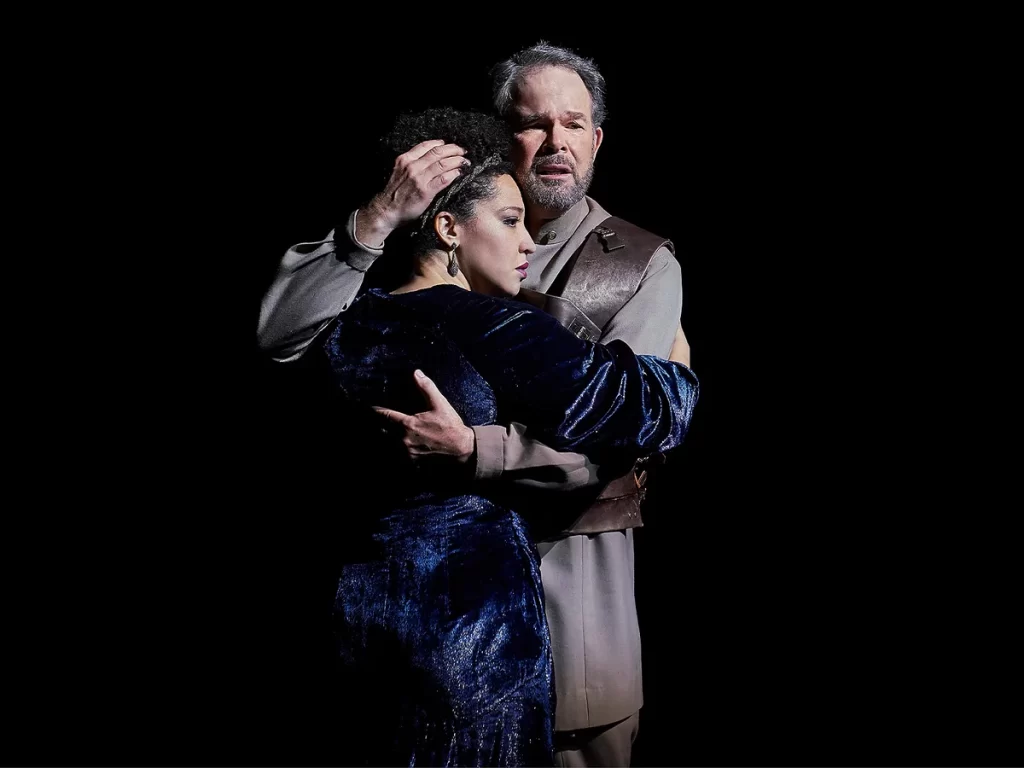VIEWPOINTS – John Adams’ operatic adaptation of ANTONY AND CLEOPATRA faithfully channels Shakespeare but makes for unfocused opera
- By drediman
- June 5, 2025
- No Comments

This week at the Metropolitan Opera, I finally caught up with John Adams’ operatic adaptation of Shakespeare’s Antony and Cleopatra. Adams’ new two act opera follows in the footsteps of the composer’s Nixon in China, The Death of Klinghoffer, Doctor Atomic, and last season’s El Niño as a contemporary American opera of note to be staged at The Met (Antony and Cleopatra has been co-commissioned by The Met, San Francisco Opera, and Liceu Opera Barcelona). Collaborating with director Elkhanah Pulitzer and dramaturg Lucia Scheckner on the libretto — which draws directly from Bard’s text — Adams brings to the operatic stage the eventful, notoriously tumultuous romance between the torn Roman general Mark Antony and the sultry, defiantly modern Egyptian queen Cleopatra.
Given its relentlessly forward-moving plot, Antony and Cleopatra would seem an odd choice for operatic treatment. The opera’s organic, richly orchestrated score — which the Adams himself confidently conducted — marks an interesting evolution for the influential and highly regarded American composer, who draws inspiration from the swiftly moving narrative to propel his musical composition. Dynamically straddling lyricism and pulsating minimalism, the music strives to articulate the emotional nuances of the characters’ inner lives, while capturing the urgency of the their public and political dealings. Despite the admirable faithfulness to Shakespeare’s text — which has been augmented by other classical texts by the likes of Plutarch and Virgil — the libretto at times enforces a certain unnecessary breathlessness to the proceedings. It also means that the opera concludes in indulgently drawn out death scenes. Indeed, the opera fizzles out when it should end with a bang, as most opera with similarly tragic outcomes do.
In a fascinating directorial choice, Pulitzer has updated the story from Ancient Rome to 1930s Hollywood, as if commenting on the extravagant narcissism of the main players. Fair enough, although I’m ultimately agnostic about the overlay. Nevertheless, the staging moves along at a vigorous clip — kudos to the hardworking Met Chorus and the dance ensemble — although at times the production did seem a tad diminutive on the massive Met stage. In the titular roles, soprano Julia Bullock and bass-baritone Gerald Finley gave forceful dramatic performances, portraying a smoldering romance via their acting even if wasn’t always apparent in the score. Additionally, their well-matched creamy tones and vocal power sat beautifully on Adams’ score. Perhaps best of all was Tenor Paul Appleby, whose robustly sung, incisively acted Caesar elevated the role to the same level as the legendary lovers.
SOMEWHAT RECOMMENDED
ANTONY AND CLEOPATRA
Opera
The Metropolitan Opera
3 hours, 5 minutes (including an intermission)
In repertory through June 7

 Copyright © 2025
Copyright © 2025
Leave a Reply